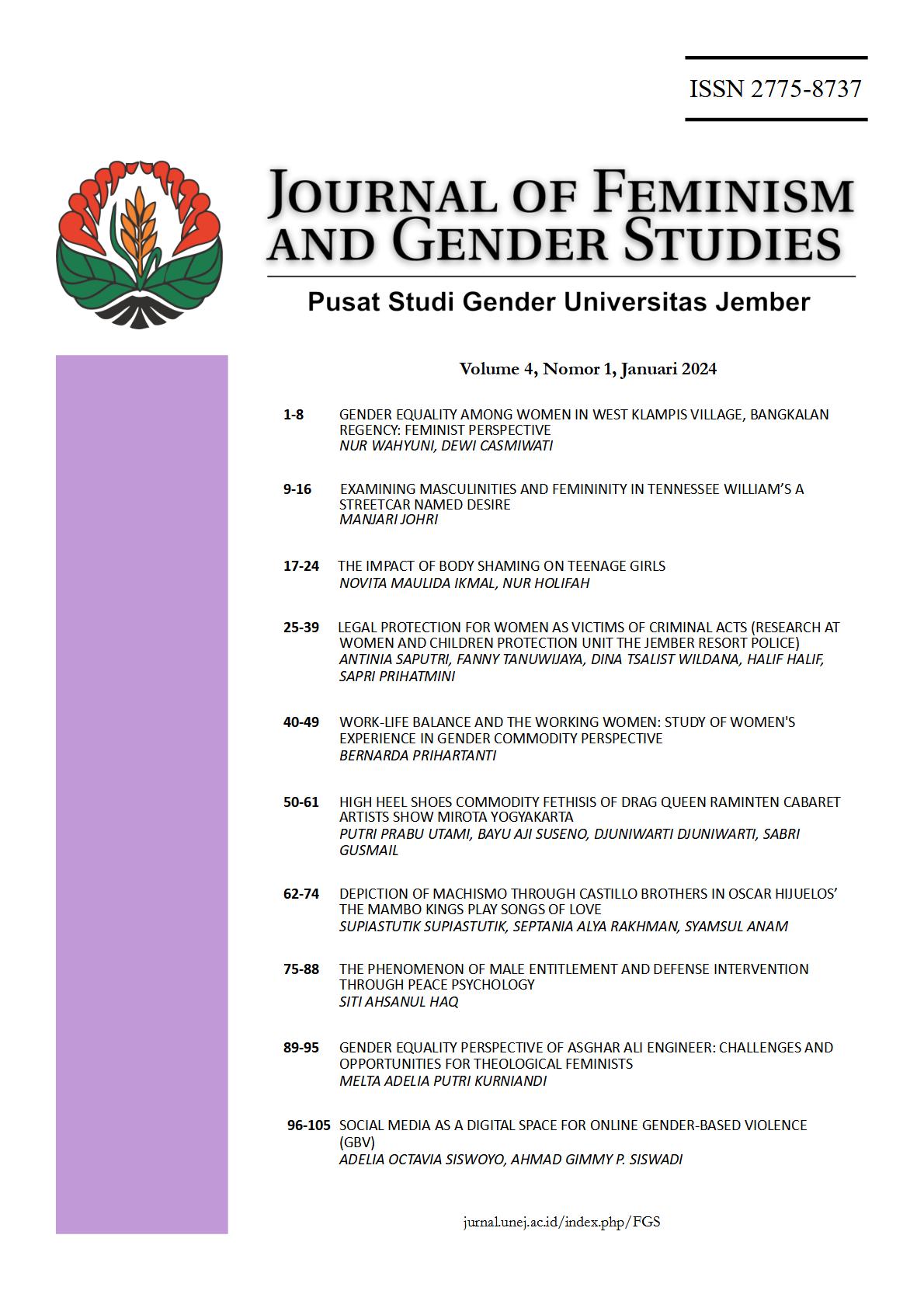Gender Equality Perspective of Asghar Ali Engineer: Challenges and Opportunities for Theological Feminists
DOI:
https://doi.org/10.19184/jfgs.v4i1.44611Keywords:
Asghar Ali Engineer; Feminis Teologis; GenderAbstract
Gender equality in the Islamic context is in deep focus, especially through the lens of feminist theology. This article explores the views of Asghar Ali Engineer, a Muslim activist, who advocates the need to treat women as equals to men and redefine sharia law regarding gender issues. The main focus is on the challenges and opportunities facing feminist theology in Islam, with an emphasis on the concept of gender equality and its impact on Muslim women. This research adopts a qualitative approach, analyzing and exploring data from key works such as "Islamic Liberation Theology" by Latief Muhaemin and the works of Asghar Ali Engineer. Feminist theologians, including Engineer, face the challenges of reconstructing religious texts, deconstructing traditional understandings that devalue women, and resolving socio-cultural challenges related to religious law and social norms. With a socio-theological approach, they emphasize the importance of understanding the social context and reinterpreting key concepts to suit the needs of the times. In an effort to create a non-exploitative life order, theological feminists such as Engineer strive to provide equal opportunities for women and men, including in aspects of leadership, to bring positive changes in the interpretation of Islamic religious teachings in the 21st century.
Downloads
References
Amaladoss, M. (2001). Life In Freedom: Liberation Theologies From Asia (A. Widyamartaya & Cindelaras, Trans.). Teologi Pembebasan Asia. Yogyakarta: Pustaka Pelajar. (h. 65)
Anita Juliani, Radea Yuli Hambali. (2022). “Teologi Pembebasan Perempuan Perspektif Asghar Ali Engineerâ€. Jurnal Riset Agama. 2 (02), 324, https://doi.org/10.15575/jra.v2i2.17551
Asghar Ali Engineer. (2007). The Qur’an and Modern Women and Modern Society (2nd ed.). Agus Nuryatno (Trans.). Yogyakarta: LKiS.
Asizah, Siti et al. (2016). Kontekstualisasi Gender Islam Dan Budaya. Seri Kemitraan Universitas Masyarakat UIN Alauddin Makassar.
Diana, Rita. (2018). “ANALISIS KETIMPANGAN GENDER DI PROVINSI SUMATERA
BARAT.†Jurnal Kependudukan Indonesia 13, (1): 58 https://doi.org/10.14203/jki.v13i1.303
Hasna Safarina Rasyidah. Et al. (2015).“ Asghar Ali Engineer’s Concept On Women Liberation ( An Islamic Response )â€. University Research Colloquium. https://www.academia.edu/28500957/Asghar_Ali_Engineers_Concept_on_Women_Liberation
Khairul Mufti Rambe.(2016) "Hak Perempuan Dalam Perspektif Ashgar Ali Engineer". Jurnal JISA: Jurnal Ilmiah Sosiologi Agama.https://dx.doi.org/10.18592/jiu.v10i1.744
Muhaemin, Latief. (2017). Teologi Pembebasan Dalam Islam. Jakarta: Orbit Publishing.
M. Mukhtasar. (2000). Teologi Pembebasan menurut Ashgar Ali Engineer: Makna Relevansinya Dalam Konteks Pluralitas Agama Di Asia. Jurnal Filsafat. 31, 263
Muhammad Adres Prawira. (2022)."Keadilan Gender Dan Hak-Hak Perempuan Dalam Islam (Studi Analitis Pemikiran Ashgar Ali Engineer)â€. Az-Zahra: Journal Of Gender and Family Studies. http://dx.doi.org/10.15575/azzahra.v2i2.15840
Rosnaeni. (2021).“Pandangan Asghar Ali Engineer Tentang Kesetaraan Genderâ€.Tadarus Tarbawy: Jurnal Kajian Islam Dan Pendidikan, 03 (02), 347,http://dx.doi.org/10.31000/jkip.v3i2.4787
Siti Khusnul Khotimah. (2020).“Fikih Feminis Prespektif Asghar Ali Engineerâ€. An-Nisa’.8 (2), 2020, 102
Â



